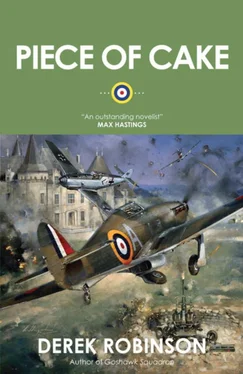“Well, that’s something,” Fanny said.
“And with absolute confidence, only about those sects in the latter years of Elizabeth.”
“I see.”
“It’s a very rich field, you know, very rich indeed. The source material is extremely dense. One hardly knows where to begin.”
“I usually start with A to K,” Cattermole said, “and then look in L to Z later on.”
“Moggy, behave yourself,” Fanny said.
“Might you be interested in the work of the later Elizabethan north-country Puritan sects?” Skelton asked Pip.
Pip weighed politeness against honesty. Honesty won. “No,” he said.
“I think you’re wise. The more I study them, the less I like them. Thoroughly unattractive people, in the main. It will be refreshing to get away from them.”
At some point in the evening, Skelton was nicknamed “Skull.” He was rapidly accepted into the squadron, especially when they found he was good at card tricks. As intelligence officer he could tell them nothing new about the war, but then there seemed to be little or nothing worth knowing. The blackout was working. People were busy sticking lengths of tape across their windows to save themselves from being sliced by flying glass. Evacuation continued: the trains were full of mothers and children. Large barrage balloons floated in silvery fleets above the cities. The newspapers were busy with Poland’s heroic resistance, with cavalry fighting tanks while Stukas screamed out of the skies and Warsaw burned; but Poland was more than “abroad,” it was foreign, distant, remote, not really European at all, more like a part of Russia. A year ago, Hitler had been groping for Czechoslovakia and the Prime Minister had talked of this as “a quarrel in a far-away country between people of whom we know nothing.” Czechoslovakia had gone down. Now it was Poland. As far as the pilots were concerned, it was a distinction without a difference.
Not surprisingly—with Fanny Barton absent, attending to paperwork—the pilots soon lost interest in the Air Ministry’s secret Anglo-Polish glossary. Flip Moran went around and quietly gathered up the copies and gave them to the barman to keep. The second day of the war ended as boringly as the first, except for one thing. The BBC announced that a passenger ship, the SS Athenia, outward bound from Britain, had been torpedoed and sunk in the Atlantic with heavy loss of life, including many children.
That was nasty. That was a damn sight closer to home than Warsaw. The Navy had better get its finger out and do something about those bloody U-boats. Everyone was agreed on that. Group released the squadron at dusk, just in time to get over to the Squirt for a beer.
While he was shaving, Fanny Barton realized that this was now his third day as squadron commander. He wondered why Air Ministry was taking so long to replace the Ram. The thought drifted into his head that maybe they were waiting and watching to see what sort of a job he made of it. If he made a good job, maybe they would let him keep the squadron permanently.
The idea excited and worried him. That face in the mirror looked intelligent and disciplined, but was it old enough? Strong enough? Hard enough? He bared his teeth at himself to see how brave and dashing he looked. Not very. It would certainly be gratifying to be a fullblown squadron leader; thrilling, in fact; on the other hand leading a whole squadron, taking command of a dozen Hurricanes, telling them where to go and what to do, and if he got it wrong then men got blown up, shot down, killed—that was a hell of a responsibility.
Hell of a responsibility.
After breakfast he called a meeting of Flip Moran, Kellaway and Skull.
“I’ve talked to Group again,” he said. “I told them we can’t go on sitting around here waiting to be scrambled from dawn to dusk, it’s bad for the chaps, they’re getting thoroughly browned-off. Well—surprise, surprise, Group agrees. I think they’ve been given the same treatment by other squadrons. Anyway, this is the new deal: one flight released, the other flight on twenty-minute readiness, starting now.”
“What is twenty-minute readiness, exactly?” Skull asked. Flip looked sideways at him. “My dear fellow,” Skull said sharply, “if I am to be an effective intelligence officer I need to understand these terms.”
“Didn’t anybody ever tell you?” Flip said.
“Once, a very long time ago. No doubt the system has been changed since then.”
“We’re either ‘released’ or ‘available,’” Fanny said. “If we’re ‘released’ we can leave the airfield. ‘Available’ means we stay here. ‘Brought to readiness’ means we’ve got to be ready to take off in whatever time the controller says—thirty minutes, twenty, fifteen, it depends how serious he reckons things are. If he knows he’s going to want us off in a hurry he puts us on five-minute standby. If it’s a hell of a hurry, two-minute standby.”
“I see,” said Skull. “Thank you.”
“And in an extreme emergency,” said Flip, “the ground crews have been trained to catapult the airplanes into the sky, using powerful lengths of knicker-elastic.”
“How resourceful of them,” Skull said. “No doubt it creates a most impressive twang.”
“If you two want to practice your backchat, find a better time for it,” Fanny said. His curtness surprised them. He surprised himself a little, and he rapped on his desk to confirm his authority. “I’m not satisfied with the squadron spirit,” he said. “There’s something lacking, I’m not sure what, but…” He chewed his lip and looked at them. That was pretty bloody feeble, Barton, he thought.
Nobody answered. Skull couldn’t be expected to comment, and Flip had gone into his shell. The adjutant was lighting his pipe. “Well?” Fanny said.
Kellaway put his head back. He blew a great plume of smoke at the hanging light and made it rock. “The boys are a bit stale, aren’t they? Cooped-up too much, no action. Why not give them a spot of recreation? Fitz has that dinghy of his down at the harbor, and…” He stopped to take a shred of tobacco off his tongue.
“I don’t think they’re stale. On the contrary, they’re half-baked.” Fanny looked at Flip and thought he saw a tinge of hostility in Flip’s expression. Again he surprised himself by welcoming this discovery: the act of command provoked tension, and tension could be enjoyable. Well, well. “Right, this is what we’ll do. ‘A’ flight stays at readiness this morning, ‘B’ flight takes over this afternoon. That gives ‘B’ flight all morning to get upstairs and learn a thing or two. Work your flight hard, Flip. I’m sure they’ll feel all the better for it.”
Flip stood. He seemed to have something in his left eye. He rubbed it unhurriedly. “What do you want us to practice?” he asked at last.
“What do you need to practice?” Fanny gave him five seconds to answer, and said, “It’s up to you, chum. Find their weaknesses and get rid of them. Okay?”
On his way out, Flip paused. “You haven’t forgotten the Polish phrasebook,” he said. All expression was carefully ironed out of his voice.
“No.”
“Is there to be an examination?”
“Certainly. I test my lot this morning, you test yours this afternoon.”
“Ah.” Flip nodded several times, and gently closed the door behind him.
Fanny chewed on a pencil, examined the battered end, looked at the adjutant. “Not exactly jumping for joy, is he?” he said.
Kellaway sat comfortably, legs crossed, arms folded, pipe drawing nicely. “Nose out of joint,” he said.
“That’s damn silly. He knew I was senior flight commander. What did he expect?”
Kellaway nodded. “Funny chap, young Flip. Too much self-control, maybe. He never allows himself to let rip, does he? Lots of ambition steaming away under the surface, I sometimes think.”
Читать дальше












